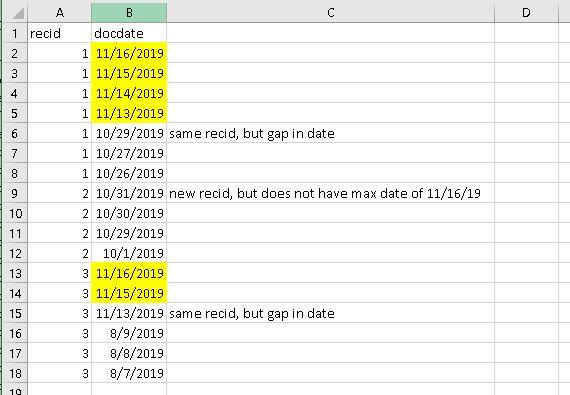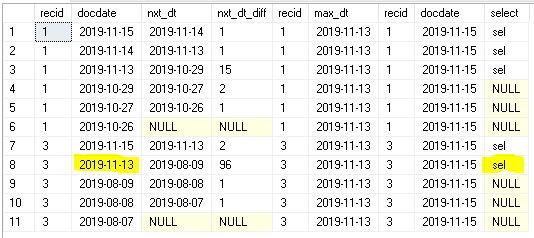T-SQL to find gaps in Date field of table
-
November 20, 2019 at 4:31 pm
I'm inexperienced in asking these questions in a forum. I'm sure there's a more elegant way to display this code, etc. I hope I can explain what I'm after here.
I have a simple table with a record ID and a date column in it. You can run this simple code to create the table if you'd like.
IF OBJECT_ID('tempdb..#tmptbl') IS NOT NULL
BEGIN
DROP TABLE #tmptbl
END
create table #tmptbl (recid int, docdate date)
insert into #tmptbl
values (1, '11/16/19'),(1, '11/15/19'),(1, '11/14/19'),(1, '11/13/19'),(1, '10/29/19'),(1, '10/27/19'),(1, '10/26/19'),(2, '10/31/19'),(2, '10/30/19'),(2, '10/29/19'),(2, '10/1/19'),(3, '11/16/19'),(3, '11/15/19'),(3, '11/13/19'),(3, '8/9/19'),(3, '8/8/19'),(3, '8/7/19')
--select * from #tmptbl order by 1, 2 desc
Here is a picture. The highlighted rows are the rows I want to return in a query.

Logic for the select statement to return the rows needed:
For each recid, determine if there is a record on 11/16/19 (this can be a passed parameter but it will always be just one particular date). If the recid does not have a record with 11/16/19 on it, return no rows for that recid. If it does, I need to return the consecutive dated rows up to that date. When there is a gap in the date for the recid, I can omit the rest of the rows for that recid. I've tried to explain the logic in comments in the picture.
Can you help give me some examples of how to accomplish this using T-SQL? ...Return only the consecutive dated rows for each recid up to the provided date (i.e. 11/16/19 in my example).
Thank you.
-
November 20, 2019 at 6:29 pm
drop table if exists #tmptbl;
go
create table #tmptbl(
recidint,
docdatedate,
constraint unq_tmptbl_recid_dt unique(recid, docdate));
go
insert into #tmptbl values
(1, '11/16/19'),(1, '11/15/19'),(1, '11/14/19'),(1, '11/13/19'),(1, '10/29/19'),(1, '10/27/19'),
(1, '10/26/19'),(2, '10/31/19'),(2, '10/30/19'),(2, '10/29/19'),(2, '10/1/19'),(3, '11/16/19'),
(3, '11/15/19'),(3, '11/13/19'),(3, '8/9/19'),(3, '8/8/19'),(3, '8/7/19');
go
--select * from #tmptbl order by 1, 2 desc
declare
@docdatedate='2019-11-16';
with
dt_cte(recid, docdate) as (
select * from #tmptbl where docdate=@docdate),
range_cte as (
select
t.*,
lead(t.docdate, 1) over (partition by recid order by docdate desc) nxt_dt,
datediff(dd, lead(t.docdate, 1) over (partition by t.recid order by t.docdate desc), t.docdate) nxt_dt_diff
from
#tmptbl t
where
t.docdate<=@docdate),
max_cte as (
select
recid,
max(docdate) max_dt
from
range_cte rc
where
docdate<@docdate
and nxt_dt_diff<>1
group by
recid)
select
*
from
range_cte rc
join
max_cte mc on rc.recid=mc.recid
join
dt_cte dc on rc.recid=dc.recid
where
rc.docdate>=mc.max_dt;
go- This reply was modified 4 years, 5 months ago by Steve Collins. Reason: Got rid of unnecessary declared variable
- This reply was modified 4 years, 5 months ago by Steve Collins.
Aus dem Paradies, das Cantor uns geschaffen, soll uns niemand vertreiben können
-
November 20, 2019 at 7:00 pm
Thank you. As I was testing with it, when I run it for 11/15/19, I get the following, where the highlighted row is selected. There is a gap before that date so it shouldn't be returned.

-
November 20, 2019 at 7:09 pm
Ok issue is the initial nxt_dt_diff is not equal to 1. Or the code doesn't handle that properly now. I'll update it.
Aus dem Paradies, das Cantor uns geschaffen, soll uns niemand vertreiben können
-
November 20, 2019 at 7:22 pm
Here is another option:
With groupedDates
As (
Select t.recid
, t.docdate
, GroupID = dateadd(day, -row_number() over(Partition By t.recid Order By t.docdate), t.docdate)
From @tmptbl t
)
Select gd2.recid
, gd2.docdate
, gd2.GroupID
From groupedDates gd
Inner Join groupedDates gd2 On gd2.recid = gd.recid
And gd2.GroupID = gd.GroupID
Where gd.docdate = '2019-11-16';- This reply was modified 4 years, 5 months ago by Jeffrey Williams.
Jeffrey Williams
“We are all faced with a series of great opportunities brilliantly disguised as impossible situations.”― Charles R. Swindoll
How to post questions to get better answers faster
Managing Transaction Logs -
November 20, 2019 at 7:23 pm
declare
@docdatedate='2019-08-09';
with
range_cte(recid, docdate, nxt_dt, nxt_dt_diff) as (
select
t.*,
lead(t.docdate, 1) over (partition by recid order by docdate desc) nxt_dt,
datediff(dd, lead(t.docdate, 1) over (partition by t.recid order by t.docdate desc), t.docdate) nxt_dt_diff
from
#tmptbl t
where
t.docdate<=@docdate),
dt_cte(recid, docdate) as (
select
recid, docdate
from
range_cte
where
docdate=@docdate
and nxt_dt_diff=1),
nxt_max_cte(recid, max_dt) as (
select
recid,
max(docdate) max_dt
from
range_cte rc
where
docdate<@docdate
and nxt_dt_diff<>1
group by
recid
union all
select
recid,
max(docdate) max_dt
from
range_cte rc
where
docdate<@docdate
and nxt_dt_diff=1
group by
recid),
max_cte(recid, max_dt) as (
select
recid,
max(max_dt) max_dt
from
nxt_max_cte
group by
recid),
union_cte(recid, docdate, nxt_dt, nxt_dt_diff, max_dt) as(
select
rc.*, mc.max_dt
from
range_cte rc
left join
max_cte mc on rc.recid=mc.recid
join
dt_cte dc on rc.recid=dc.recid
where
rc.docdate>=mc.max_dt
union all
select
rc.*, mc.max_dt
from
range_cte rc
left join
max_cte mc on rc.recid=mc.recid
where
rc.docdate=@docdate
and rc.nxt_dt_diff<>1)
select
*
from
union_cte
order by
1, 2 desc;
go- This reply was modified 4 years, 5 months ago by Steve Collins. Reason: added sorted by recid, docdate descending
- This reply was modified 4 years, 5 months ago by Steve Collins. Reason: Wasn't giving the correct output in some cases
Aus dem Paradies, das Cantor uns geschaffen, soll uns niemand vertreiben können
-
November 20, 2019 at 8:17 pm
This is great! Both work great. Thank you both.
-
November 20, 2019 at 8:34 pm
These are perfect. Thanks folks!
-
November 20, 2019 at 9:27 pm
We can actually simplify this even further:
Declare @endDate date = '2019-11-16';
With groupedDates
As (
Select t.recid
, t.docdate
, GroupID = dateadd(day, dense_rank() over(Partition By t.recid Order By t.docdate desc) - 1, t.docdate)
From #tmptbl t
Where t.docdate <= @endDate
)
Select *
From groupedDates gd
Where gd.GroupID = @endDate;In this version - we limit the results from the source table to those rows less than or equal to our end date. Then - we define the GroupID so it matches our end date and filter by that grouping.
In the first version - if you add another row in either group with the date 2019-11-17, that row will be included because there are no gaps and we are not filtering out future dates. In the second version - future dates would be excluded...
If you want to be able to select all dates with no gaps - the first version can do that...the second version must be filtered in the CTE with the filter on GroupID matching the same criteria.
Jeffrey Williams
“We are all faced with a series of great opportunities brilliantly disguised as impossible situations.”― Charles R. Swindoll
How to post questions to get better answers faster
Managing Transaction Logs -
November 20, 2019 at 10:16 pm
Jeffrey Williams wrote:Here is another option:
With groupedDates
As (
Select t.recid
, t.docdate
, GroupID = dateadd(day, -row_number() over(Partition By t.recid Order By t.docdate), t.docdate)
From @tmptbl t
)
Select gd2.recid
, gd2.docdate
, gd2.GroupID
From groupedDates gd
Inner Join groupedDates gd2 On gd2.recid = gd.recid
And gd2.GroupID = gd.GroupID
Where gd.docdate = '2019-11-16';Azure SQL doesn't like the criteria (gd.docdate = '2019-11-16') specified in the where clause. If added to the join conditions it works. Here's a variation that might work for some people:
with
grp_dt_cte as (
select
t.recid,
t.docdate,
group_id = dateadd(day, -row_number() over(partition by t.recid order by t.docdate), t.docdate)
from
#tmptbl t)
select
t.*
from
grp_dt_cte g
join
grp_dt_cte t on g.recid=t.recid
and g.group_id=t.group_id
and g.docdate=@docdate;Aus dem Paradies, das Cantor uns geschaffen, soll uns niemand vertreiben können
-
November 20, 2019 at 11:39 pm
Here's a similar way that's maybe simpler.
with x_cte as (
select
*,
row_number() over (partition by recid order by docdate desc) row_num
from
#tmptbl
where
docdate<=@docdate)
select * from x_cte
where
datediff(dd, docdate, @docdate)+1=row_num
order by
1,2 desc;Aus dem Paradies, das Cantor uns geschaffen, soll uns niemand vertreiben können
Viewing 11 posts - 1 through 10 (of 10 total)
You must be logged in to reply to this topic. Login to reply

